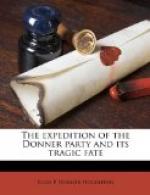At first no tears dimmed my eyes, for I felt, with keen indignation, that those wounding tales were false; but there came hours of suffering for me later, when an unsympathetic soldier, nicknamed “Picayune Butler,” engaged me in conversation and set me to thinking.
He was a great big man with eyes piercing as a hawk’s, and lips so thin that they looked like red lines on his face, parting and snapping together as he repeated the horrible things he had read in The California Star. He insisted that the Donner Party was responsible for its own misfortune; that parents killed their babies and ate their bodies to keep themselves alive; cut off the heads of companions and called them good soup bones; and were as thievish as sneaking Indians, even stealing the strings from the snowshoes of those who had come to their rescue. He maintained that Keseberg had murdered my mother and mutilated my dead father’s body; and that he himself felt that the miserable wretches brought from starvation were not worth the price it had cost to save them.
Too young, too ignorant, and too distressed to disprove the accusations or resent his individual view, I could only take refuge behind what I had heard and seen in camp, and declare, “I know it is not true; they were good people, and loved their babies, and were sorry for everybody.”
How could I believe his cruel words? While I had come from the mountains remembering most clearly the sufferings from cold, hunger, thirst, and pitiful surroundings, I had also brought from there a child’s mental picture of tenderest sympathies and bravest self-denials, evinced by the snow-bound in my father’s camp, and of Mrs. Murphy’s earnest effort to soothe and care for us three little sisters after we had been deserted at the lake cabins by Cady and Stone; also her motherly watchfulness over Jimmie Eddy, Georgia Foster, and her own son Simon, and of Mr. Eddy’s constant solicitude for our safety on the journey over the mountains to Sutter’s Fort. Vain, however, my efforts to speak in behalf of either the dead or the absent; every attempt was met by the ready assertion, “You can’t prove anything; you were not old enough to remember or understand what happened.”
Oh, how I longed to be grown, to have opportunities to talk with those of the party who were considered old enough to remember facts, and would answer the questions I wanted to ask; and how firmly I resolved that when I grew to be a woman I would tell the story of my party so clearly that no one could doubt its truth!
CHAPTER XXVI
THANK OFFERINGS—MISS DOTY’S SCHOOL—THE BOND OF KINDRED—IN JACKET AND TROUSERS—CHUM CHARLIE.
Grandma had a fixed price for table board, but would not take pay for medicines, nor for attendance on the sick; consequently, many of her patients, after reaching San Francisco, sent thank offerings of articles useful and pleasing to her. Thus, also, Sister Georgia and I came into possession of pretty calico, Swiss, and delaine dresses, and shoes that filled our hearts with pride, for they were of Morocco leather, a red and a green pair for each. We had seen finely dressed Spanish children wear such shoes, but never supposed that we should be so favored.




